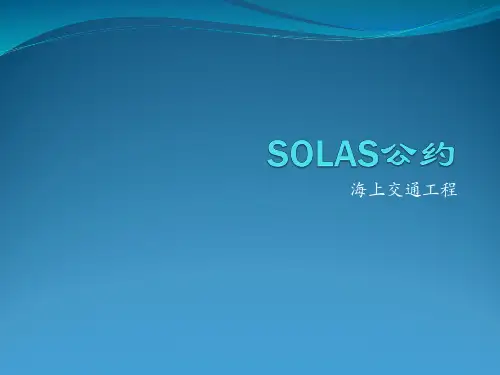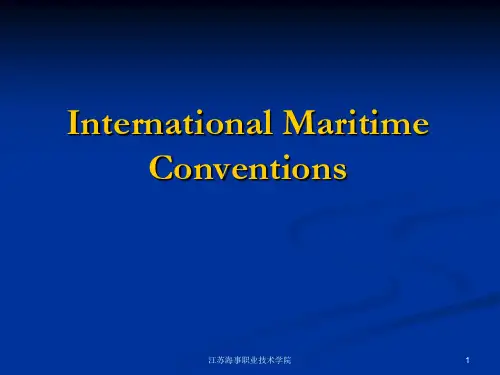国际海事公约概论44页PPT
- 格式:ppt
- 大小:4.93 MB
- 文档页数:44
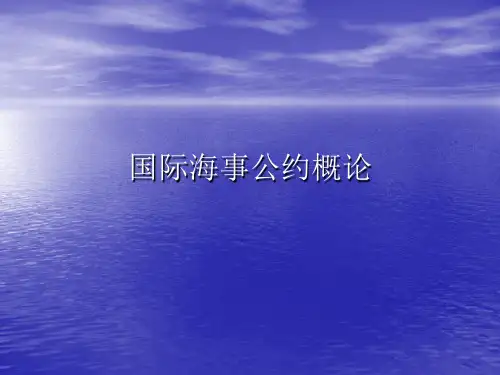
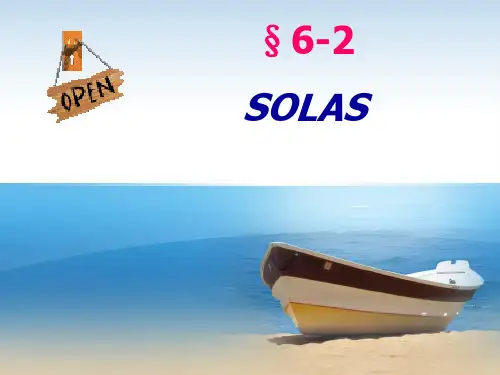

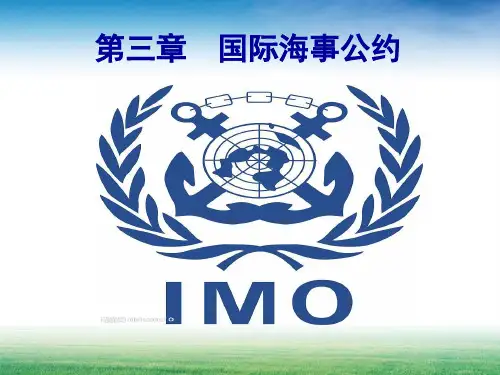
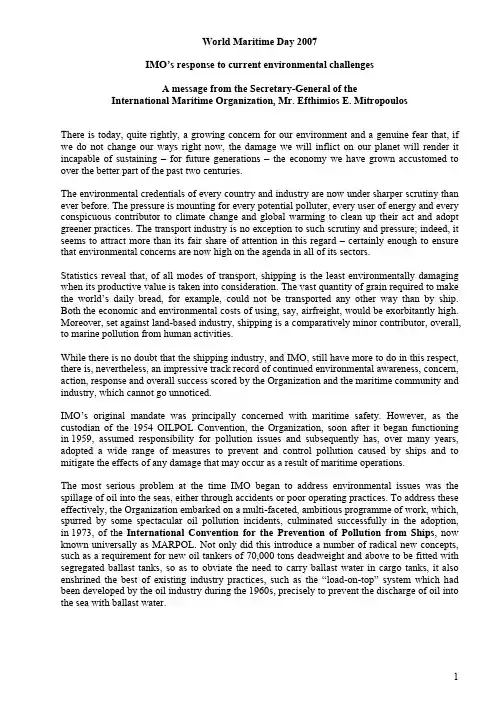
World Maritime Day 2007IMO’s response to current environmental challengesA message from the Secretary-General of theInternational Maritime Organization, Mr. Efthimios E. MitropoulosThere is today, quite rightly, a growing concern for our environment and a genuine fear that, if we do not change our ways right now, the damage we will inflict on our planet will render it incapable of sustaining – for future generations – the economy we have grown accustomed to over the better part of the past two centuries.The environmental credentials of every country and industry are now under sharper scrutiny than ever before. The pressure is mounting for every potential polluter, every user of energy and every conspicuous contributor to climate change and global warming to clean up their act and adopt greener practices. The transport industry is no exception to such scrutiny and pressure; indeed, it seems to attract more than its fair share of attention in this regard – certainly enough to ensure that environmental concerns are now high on the agenda in all of its sectors.Statistics reveal that, of all modes of transport, shipping is the least environmentally damaging when its productive value is taken into consideration. The vast quantity of grain required to make the world’s daily bread, for example, could not be transported any other way than by ship. Both the economic and environmental costs of using, say, airfreight, would be exorbitantly high. Moreover, set against land-based industry, shipping is a comparatively minor contributor, overall, to marine pollution from human activities.While there is no doubt that the shipping industry, and IMO, still have more to do in this respect, there is, nevertheless, an impressive track record of continued environmental awareness, concern, action, response and overall success scored by the Organization and the maritime community and industry, which cannot go unnoticed.IMO’s original mandate was principally concerned with maritime safety. However, as the custodian of the 1954 OILPOL Convention, the Organization, soon after it began functioning in 1959, assumed responsibility for pollution issues and subsequently has, over many years, adopted a wide range of measures to prevent and control pollution caused by ships and to mitigate the effects of any damage that may occur as a result of maritime operations.The most serious problem at the time IMO began to address environmental issues was the spillage of oil into the seas, either through accidents or poor operating practices. To address these effectively, the Organization embarked on a multi-faceted, ambitious programme of work, which, spurred by some spectacular oil pollution incidents, culminated successfully in the adoption, in 1973, of the International Convention for the Prevention of Pollution from Ships, now known universally as MARPOL. Not only did this introduce a number of radical new concepts, such as a requirement for new oil tankers of 70,000 tons deadweight and above to be fitted with segregated ballast tanks, so as to obviate the need to carry ballast water in cargo tanks, it also enshrined the best of existing industry practices, such as the “load-on-top” system which had been developed by the oil industry during the 1960s, precisely to prevent the discharge of oil into the sea with ballast water.More than 30 years later, albeit much expanded, amended and updated, the MARPOL Convention remains the most important international convention covering the prevention of pollution by ships, whether from operational or accidental causes. Today, MARPOL has six separate annexes, which set out regulations dealing with pollution from ships by oil; by noxious liquid substances carried in bulk; harmful substances carried by sea in packaged form; sewage, garbage; and the prevention of air pollution from ships. There can be no doubt that, in conjunction with a variety of other measures, MARPOL has laid the foundation for substantial and continued reductions in pollution from ships and, this, despite a massive increase in world seaborne trade.According to shipping market analysts, world seaborne trade increased by around 135 per cent between 1985 and 2006. Oil and petroleum products accounted for a significant part of this increase, rising by a similar percentage. In sharp contrast, estimates of the quantity of oil spilled during the same period show a steady reduction by some 85 per cent. Figures reveal that, despite the rare major accident, which can cause a spike in the annual statistics, the overall trend demonstrates a continuing improvement, both in the number of oil spills and quantity of oil spilled each year.In the current decade, the average number of oil spills over 700 tonnes has shrunk from over 25 in the 1970s to just 3.7. It is interesting to note, in this context, that the biggest single “decade-to-decade” reduction was from the 1970s to the 1980s, coinciding with the adoption and entry into force of the MARPOL Convention, which is rightly credited with having had a substantial positive impact in decreasing the amount of oil that enters the sea from maritime transportation activities. One major oil company has estimated that the tankers it owns, or uses under long-term lease, spill less than one teaspoon of oil for every million gallons transported; while tanker owners take pride in statistics that show that 99.9996 per cent of all oil transported by sea is delivered safely and without impact on the marine environment.While always advocating a global approach, MARPOL, nevertheless, recognizes that some areas need protection over and above that sought under normal circumstances. To this end, it defines certain sea areas as “Special Areas”, in which the adoption of special mandatory measures for the prevention of sea pollution is required, so that such areas are provided with a level of protection higher than elsewhere. Moreover, IMO has adopted criteria for the identification and designation of “Particularly Sensitive Sea Areas”, which are deemed to require an even higher degree of protection because of their particular significance for ecological or socio-economic or scientific reasons, and because they may be vulnerable to damage by international maritime activities.IMO’s environmental work in recent years has covered a remarkably broad canvas, embracing everything, from the quality of our atmosphere to the microscopic aquatic life-forms that can be transported around the world in ships’ ballast water and deposited in alien local ecosystems where, by disrupting their delicate balance, they can cause immense damage.IMO’s work on this latter topic led to the adoption, in February 2004, of the Ballast Water Management Convention, and is still continuing today. Another significant milestone for the protection of the marine environment was reached in March 2006, with the entry into force of the 1996 Protocol to the 1972 Convention on the Prevention of Marine Pollution by Dumping of Wastes and Other Matter, which represents a major change of approach to the question of how to regulate the use of the sea as a depository for waste materials in that, in essence, dumping is now prohibited, except for materials on an approved list.Other IMO Conventions deal with issues such as the use of harmful anti-fouling paint on ships’ hulls; preparedness, response and co-operation in tackling pollution from oil and from hazardous and noxious substances; and the right of States to intervene on the high seas to prevent, mitigate or eliminate danger to their coastlines or related interests from pollution following a maritime casualty.The issue of ship recycling has also become a growing concern, not only from the environmental point of view but also with regard to the occupational health and safety of workers in the industry. IMO is currently developing a new mandatory instrument providing legally binding and globally applicable ship-recycling regulations for international shipping and recycling facilities, which is due for adoption in the 2008-2009 biennium. And, in May of this year, IMO adopted a new Convention on the removal of wrecks that may present either a hazard to navigation or a threat to the marine and coastal environments, or both.Although IMO’s traditional role is dealing with shipping and shipping-related accidents, we have, from time-to-time, also become involved in the aftermath of marine pollution incidents emanating from sources outside shipping operations. There is sound basis in international law for our participation in the response to such incidents, through such treaties as the UN Convention on the Law of the Sea and the International Convention on Oil Pollution Preparedness, Response and Co-operation. Last year, for example, we helped to draw up and implement an action plan to assist the authorities in Lebanon with the clean-up of coastal oil pollution following an air-strike on a refinery. The plan was agreed at an international meeting convened by IMO and the United Nations Environment Programme (UNEP) in Piraeus, Greece, and its execution was supervised by the IMO-administered Regional Marine Pollution Emergency Response Centre for the Mediterranean Sea (REMPEC) and the Minister of the Environment of Lebanon.But perhaps the most significant threat to our environment today concerns atmospheric pollution. And, once again, although the shipping industry is but a small contributor to the total volume of gas emissions – compared to road vehicles, aviation and public utilities, such as power stations – atmospheric pollution from ships has, nevertheless, been significantly reduced in the last decade and IMO continues to work towards further reductions as the evidence mounts and the world becomes more aware and more concerned about the further damage that might be caused if, from our various perspectives as Governments, industry and individuals, we do not address the challenges posed by air pollution, global warming and climate change.A good deal has already been done by the shipping sector. Annex VI of MARPOL, for example, set, for the first time, limits on sulphur oxide (SOx) and nitrogen oxide (NOx) emissions from ship exhausts; prohibited deliberate emissions of ozone-depleting substances; and put a global cap on the sulphur content of fuel oil. It also contains provisions allowing for special SOx Emission Control Areas to be established (such as, for example, those agreed for the Baltic and North Sea areas), with more stringent controls on sulphur emissions. However, although the Annex entered into force in 2005, it had actually been adopted as long ago as 1997. As a result, a comprehensive review of its provisions, taking into account experience gained thus far in its implementation, as well as improvements in engine and fuel technology, is currently underway at IMO.Whether we like it or not, there is no avoiding the fact that the modern world is utterly dependent on motorized transport systems that run largely on fossil fuels. Moreover, it is also a fact of life that the use of fossil fuels carries an environmental burden. An engine burning fossil fuel will emit a quantity of so-called greenhouse gases (GHGs), principally CO2, and these emissions are now widely accepted as being significant contributory factors towards global warming and climate change.Although no mandatory instrument has yet been adopted by IMO to cover the emission of GHGs from ships, the Organization has given ample consideration to the matter, leading to the adoption, in December 2003, of an Assembly resolution on the reduction of such emissions from ships.The most comprehensive assessment to date of the contribution made by international shipping to climate change is contained in the IMO Study on GHG Emissions from Ships published in June 2000. This study identified a number of areas in which there was considerable potential for the further reduction of CO2 emissions from ships, such as optimization of hull shape, hull maintenance, propeller design and maintenance, fuel choices, machinery monitoring, ship-routeing considerations, and optimizing vessel trim, engine performance, propeller pitch and rudder angles. The study cautioned, however, that if none of the measures are applied, the projected annual growth in the world fleet size could lead to an increase in fuel consumption of some 72 per cent between the years 2000 and 2020.This study is now being updated, and a work plan with a timetable has been adopted for IMO’s future work on the reduction of GHGs from ships, in which the Organization intends to maintain its leading position, co-operating closely with international shipping and with other relevant UN bodies, to avoid unilateral action either on a global, regional or national level.* * *IMO has, over the years, adopted a wide range of measures to prevent and control pollution caused by ships and to mitigate the effects of any damage that may occur. These are all positive proof of the firm determination of Governments and the industry to reduce, to the barest minimum, the impact that shipping may have on our fragile environment. There remain, however, serious concerns at the slow pace of ratification of IMO’s environmental conventions. It took almost eight years, for example, for MARPOL’s Annex VI to reach its entry into force criteria – by which time, as mentioned earlier, it needed to undergo a substantial review; and neither the 2004 Ballast Water Management Convention nor the 2001 International Convention on the Control of Harmful Anti-fouling Systems on Ships are yet in force.My concerns in this area are threefold: first, that by not bringing IMO instruments into force at a reasonable time after their adoption, their implementation is delayed, thereby depriving the environment of their beneficial effects; second, that any further delay in tackling the issues regulated by such instruments may spur unilateral or regional measures by individual countries or groups of countries, with all the attendant negative repercussions such actions entail; and, third, that any prolongation of the situation may lead to ambiguities, which, in the final analysis, may count against seafarers, the maritime industry and the environment.The urgent need to ratify, as soon as possible, not only IMO’s environmental but, indeed, all outstanding Conventions adopted under its auspices, should be promptly recognized by all the parties concerned. After all, it was thanks to the strenuous and concerted efforts of the same Governments, working together under the aegis of the Organization, over long periods of time, that these Conventions were developed and adopted in the first place.But, even more than this, I do not wish to see the maritime community stand accused of failing in its duty towards the protection and preservation of this beautiful planet, which, it seems to me, we have neglected for too long.IMO’s work in this respect must be part of a broad-based effort in which everyone has a responsibility and everyone has a role to play, a concept precisely reflected in the well-known environmental call to action “think globally – act locally”. And, in the long term, society will need to address its own priorities and understand that nothing comes for nothing and that there will be prices and sacrifices that we must be prepared to pay and make, for the greater good of all.The decision of the IMO Council to select environmental issues to take centre stage this year, as the theme for World Maritime Day, was timely and appropriate. The theme will play centrepiece in a host of activities and initiatives, which will form part of a concerted action plan that we have been undertaking to educate people; increase their awareness about the true, and deteriorating, state of the planet; and help us all to become responsible citizens, in its fullest sense. It is only very recently that mankind has begun to understand that the planet that sustains us and gives us life is a fragile entity and that our actions can, and do, have massive repercussions. That the earth and its resources do not belong to us and are not ours to squander without thought for the future is not proving an easy lesson for us to learn, but we are gradually succeeding – or, at least, waking up to the enormity of the task that confronts us.___________。

国际海事组织公约文章属性•【缔约国】国际海事组织•【条约领域】海事•【公布日期】1948.03.06•【条约类别】公约•【签订地点】日内瓦正文国际海事组织公约(1948年3月6日订于日内瓦)第一章本组织宗旨第一条本组织的宗旨为:一、在与从事国际贸易的航运的各种技术问题有关的政府规章和惯例方面,为各国政府提供合作机构;并在与海上安全、航行效率和防止及控制船只对海上污染有关的问题上,鼓励各国普遍采用最高可行的标准;并处理与本条所规定宗旨有关的行政与法律问题。
二、鼓励各国政府取消其对从事国际贸易的航运的歧视行为和不必要的限制,以便在没有歧视的基础上增进航运事业对世界贸易的效用;一国政府为发展本国航运事业并为安全目的而给予航运业的帮助和鼓励,如非基于旨在限制其他国家航运业自由参加国际贸易的措施,并不构成歧视行为;三、将有关航运业所采取的不正当的限制措施问题,根据第二章规定提交本组织研究;四、将联合国的任何机构或专门机构可能委托的有关航运和航运对海洋环境影响的任何问题,提交本组织研究;五、为各国政府交流有关本组织所研究的问题的情报。
第二章职权第二条为达到第一章所列各种目的,现将本组织的职权规定如下:一、对于会员、联合的任何机构或专门机构,或其他政府间的组织向本组织提出的第一条第一、二、三各款内的问题,或第一条第四款内的问题,除适用第三条的规定外,本组织加以研究,并提出意见;二、负责公约、协议或其他文件的起草工作,并向各国政府和政府间的组织推荐这些公约、协议或文件;必要时,并召集会议进行讨论;三、为会员之间进行协商,并为各国政府交流情报提供机构;四、履行与本条第一、二及三款有关的职权,尤其应履行有关海事问题的国际文件所赋予的职权;五、根据需要并按第十章规定,促进本组织宗旨范围内的合作。
第三条对于本组织认为可能通过国际航运业的正常手续处理的问题,本组织将建议按照正常手续处理。
当本组织认为与某些航运业所采取不正当的限制措施有关的任何问题,不可能或者事实已经证明不可能通过国际航运业的正常手续处理,经其中一个会员提出要求,本组织应对此问题加以研究,但须先由有关会员进行直接谈判。
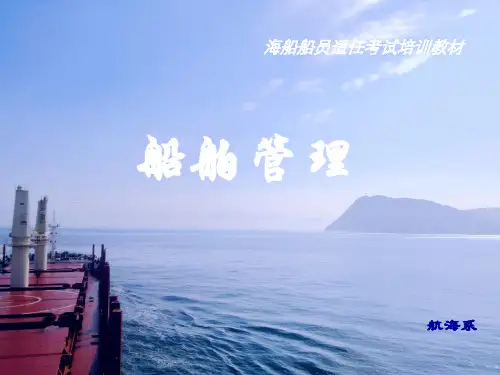
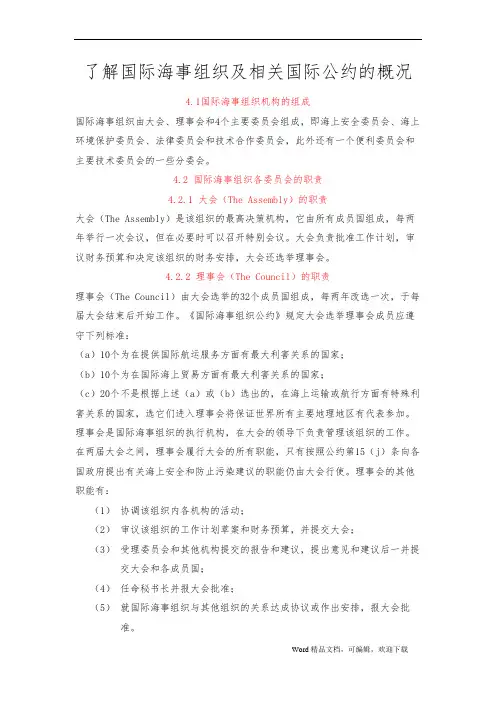
了解国际海事组织及相关国际公约的概况4.1国际海事组织机构的组成国际海事组织由大会、理事会和4个主要委员会组成,即海上安全委员会、海上环境保护委员会、法律委员会和技术合作委员会,此外还有一个便利委员会和主要技术委员会的一些分委会。
4.2 国际海事组织各委员会的职责4.2.1 大会(The Assembly)的职责大会(The Assembly)是该组织的最高决策机构,它由所有成员国组成,每两年举行一次会议,但在必要时可以召开特别会议。
大会负责批准工作计划,审议财务预算和决定该组织的财务安排,大会还选举理事会。
4.2.2 理事会(The Council)的职责理事会(The Council)由大会选举的32个成员国组成,每两年改选一次,于每届大会结束后开始工作。
《国际海事组织公约》规定大会选举理事会成员应遵守下列标准:(a)10个为在提供国际航运服务方面有最大利害关系的国家;(b)10个为在国际海上贸易方面有最大利害关系的国家;(c)20个不是根据上述(a)或(b)选出的,在海上运输或航行方面有特殊利害关系的国家,选它们进入理事会将保证世界所有主要地理地区有代表参加。
理事会是国际海事组织的执行机构,在大会的领导下负责管理该组织的工作。
在两届大会之间,理事会履行大会的所有职能,只有按照公约第15(j)条向各国政府提出有关海上安全和防止污染建议的职能仍由大会行使。
理事会的其他职能有:(1)协调该组织内各机构的活动;(2)审议该组织的工作计划草案和财务预算,并提交大会;(3)受理委员会和其他机构提交的报告和建议,提出意见和建议后一并提交大会和各成员国;(4)任命秘书长并报大会批准;(5)就国际海事组织与其他组织的关系达成协议或作出安排,报大会批准。
4.2.3 海上安全委员会(MSC)的职责海上安全委员会(MSC)是该组织的最高技术机构。
它由国际海事组织所有成员国组成。
海上安全委员会的职能是“在国际海事组织的职权范围内研究有关助航设备、船舶的构造和设备、安全配员、避碰规则、危险货物操作、海上安全程序和要求、航道信息、航海日志和航行记录、海难事故调查、救捞和救助及其他直接影响海上安全的事宜。
